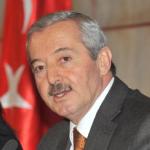The Human Rights Report 2008 on Turkey published by the U.S. Department of State’s Bureau of Democracy, Human Rights and Labor listed many threats to the freedom of expression and press freedom caused by Article 301 of the Turkish Penal Code and the Anti-Terrorism Law.
"Efforts beyond governments"
The report on Turkey is part of a general human rights report covering all countries outside of the USA. On the occasion of its publication, US Secretary of State Hillary Rodham Clinton spoke of her nation’s commitment to promoting human rights, saying:
“We will make this a global effort that reaches beyond governments alone. I intend for us to work with nongovernmental organizations, businesses, religious leaders, schools and universities as well as individual citizens, all of whom can play a vital role in creating a world where human rights are accepted, respected, and protected.”
The report states that it is not possible to criticise the state and the government freely and without fear in public:
“The government limited freedom of expression through the use of constitutional restrictions and numerous laws, including articles of the penal code prohibiting insults to the government, the state, the ‘Turkish nation,’ or the institution and symbols of the republic. Limitations on freedom of expression applied to the Internet, and courts and an independent board ordered telecommunications providers to block access to Web sites on approximately 1,475 occasions.”
Many issues still taboo
Freedom of expression on many issues, so the report, is still restricted:
“Active debates on human rights and government policies continued, particularly on issues relating to the country's EU membership process, the role of the military, Islam, political Islam, the question of Turks of Kurdish and other ethnic or religious origins as "minorities," and the history of the Turkish-Armenian conflict at the end of the Ottoman Empire. However, persons who wrote or spoke out on such topics, particularly on the Armenian issue, risked prosecution.”
The report further discussed the murder of journalist Hrant Dink in January 2007 and the increase in pressure on books about the Kurdish issue. Details about the cases of many journalists, writers, politicians and others are given:
Writers Temel Demirer and Orhan Miroğlu, publisher Ragıp Zarakolu, translators Atilla Tuygan and Mehdi Tanrıkulu, singer Bülent Ersoy, university student Durmuş Şahin, pro-Kurdish Democratic Society Party (DTP) officials Hilmi Aydoğdu and Hüseyin Kalkan, journalists Lale Sarıibrahimoğlu, Ahmet Şık, Alper Görmüş, Cengiz Kapmaz, Sakine Aktan, Sebati Karakurt, Necdet Tatlıcan and Hasan Kılıç are all discussed in terms of freedom of expression court cases. (EÖ/AG)









